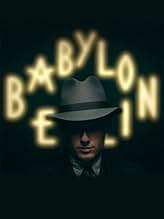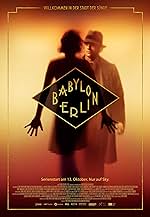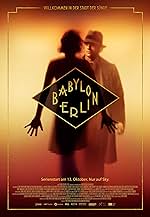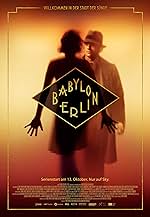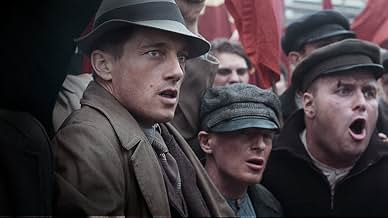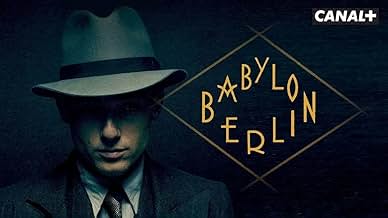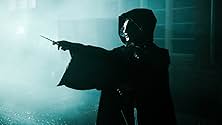O comissário de Colonia Gereon Rath se muda para Berlim, o epicentro das mudanças políticas e sociais do Dorados Veinte.O comissário de Colonia Gereon Rath se muda para Berlim, o epicentro das mudanças políticas e sociais do Dorados Veinte.O comissário de Colonia Gereon Rath se muda para Berlim, o epicentro das mudanças políticas e sociais do Dorados Veinte.
- Prêmios
- 25 vitórias e 20 indicações no total
Explorar episódios
Avaliações em destaque
(Review updated after Season 4).
Berlin, 1929. A detective from Cologne, Gereon Rath, is seconded to the vice squad in order to crack a series of blackmail cases. Meanwhile a train from Moscow to Berlin is hijacked by communist revolutionaries. The train is carrying more than it appears.
Superb drama series. At the most basic level this is a crime/detective drama and a very good one. Always intriguing with multiple strands of plots operating, seemingly in parallel. The separate plots do coalesce eventually, forming a picture that is more than the sum of the parts.
Great, gritty depiction of life. Hardly any character is non-expendable and sub-plots don't always have happy endings.
Some great character development and character-based sub-plots too. The story arc of Charlotte Ritter is particularly interesting and engaging. On this note, great work by Volker Bruch as Rath and Liv Lisa Fries as Ritter but the casting and performances of all involved are spot-on.
What lifts this series to another level, however, is the historic background and the feeling that you're seeing history being played out before your eyes. You see the changes and upheavals occurring in Germany, especially the rise of the National Socialists (Nazis), and how this affects the country and life in general.
The historic side is not merely a backdrop but part of the plot. The rise of the Nazis has a significant impact on the plot, especially in Season 3 and probably more so in forthcoming seasons. Rather than a crime drama, the series could easily be a study on Germany's path to World War 2.
This historic aspect increases in significance as the series goes on, culminating in Season 3 which is a great mix of classic whodunnit, political machinations and historic events.
There is a downside to the historic side though. Any time the police are up against National Socialists you know they are going to be stymied by the politics and the influence the Nazis hold in high places. Does make the series quite frustrating at times (well, I did say it was gritty) and it will be interesting to see how the writers pivot away from this obvious perennial dead end, especially as the National Socialists gain more power.
This political aspect comes to a head in Season 4 as the police and SA, the paramilitary wing of the National Socialist Party, clash.
Season 4 also marks a downturn in the quality of the show as the plot becomes less watertight, being inconsistent, haphazard and contrived at times. It's also quite unfocussed as we have several sub-plots in play, many of which are unconnected with anything else going on. The interest and engagement levels suffer as a result.
S4 is still reasonably interesting though, just not as good as previous seasons.
Season ratings: S1 8/10, S2 9, S3 10, S4 7.5.
Berlin, 1929. A detective from Cologne, Gereon Rath, is seconded to the vice squad in order to crack a series of blackmail cases. Meanwhile a train from Moscow to Berlin is hijacked by communist revolutionaries. The train is carrying more than it appears.
Superb drama series. At the most basic level this is a crime/detective drama and a very good one. Always intriguing with multiple strands of plots operating, seemingly in parallel. The separate plots do coalesce eventually, forming a picture that is more than the sum of the parts.
Great, gritty depiction of life. Hardly any character is non-expendable and sub-plots don't always have happy endings.
Some great character development and character-based sub-plots too. The story arc of Charlotte Ritter is particularly interesting and engaging. On this note, great work by Volker Bruch as Rath and Liv Lisa Fries as Ritter but the casting and performances of all involved are spot-on.
What lifts this series to another level, however, is the historic background and the feeling that you're seeing history being played out before your eyes. You see the changes and upheavals occurring in Germany, especially the rise of the National Socialists (Nazis), and how this affects the country and life in general.
The historic side is not merely a backdrop but part of the plot. The rise of the Nazis has a significant impact on the plot, especially in Season 3 and probably more so in forthcoming seasons. Rather than a crime drama, the series could easily be a study on Germany's path to World War 2.
This historic aspect increases in significance as the series goes on, culminating in Season 3 which is a great mix of classic whodunnit, political machinations and historic events.
There is a downside to the historic side though. Any time the police are up against National Socialists you know they are going to be stymied by the politics and the influence the Nazis hold in high places. Does make the series quite frustrating at times (well, I did say it was gritty) and it will be interesting to see how the writers pivot away from this obvious perennial dead end, especially as the National Socialists gain more power.
This political aspect comes to a head in Season 4 as the police and SA, the paramilitary wing of the National Socialist Party, clash.
Season 4 also marks a downturn in the quality of the show as the plot becomes less watertight, being inconsistent, haphazard and contrived at times. It's also quite unfocussed as we have several sub-plots in play, many of which are unconnected with anything else going on. The interest and engagement levels suffer as a result.
S4 is still reasonably interesting though, just not as good as previous seasons.
Season ratings: S1 8/10, S2 9, S3 10, S4 7.5.
A novel. Impressive at whole.Inspiring a serie fascinating episode by episode. The result is just seductive. as guide of a world, as example of high craft, as images of good performances and atmosphere. A serie ignoring taboos for a large and precise picture of a reality not very comfortable but useful for understand the events after it. Crimes, secrets, politics,sex, violence . A remarkable contribution has Volker Bruch, giving the precise character - interpreter of a Berlin out of limits.And impecable characters. So, great work
I watched this after listening to an NPR review. I love history, but crime and violence Is not my usual genre. This is such an amazingly shot series with twist and turns through out the plot that I have become fully addicted up to epi 8( even with the subtitles). A dark story during dark & violent times in 1929 Berlin, it is full of sad situations, the afternath of war on it's vets and population, corruption, decadence and interesting characters. Perhaps a lesson for current times, but when have we ever learned from the past?
This series deserves all the accolades & awards it's been given.Give it a go, you won't be sorry.
The program is everything everyone is saying... but watch it in the original German only.
The English soundtrack is absolutely horrendous. It is truely so bad that it completely alters the rating for this brilliant piece of television. It sounds like a bunch of drama students took a bunch of downers and sat around a table to read the script. There is no emotion, commitment or ownership of the characters.
And what characters there are! Babylon Berlin is an intriguing world beautifully filmed, scripted and acted.
If, like me you started watching in English and thought it was pox... do yourself a favour, watch in German and experience Babylon Berlin as it was envisioned.
There really aren't enough adjectives to describe Babylon Berlin, an incredible German television series. And I have to echo what the other reviewers say, watch it in German with English subtitles.
This is 1920s Berlin, and the show immediately pulls you into that world, that atmosphere of the Weimar era.
This was a time of great upheaval in Germany - there is poverty, no work, and yet Berlin is a city of great art and hedonistic pleasure. The story focuses on a police inspector, Gereon Rath, who comes to Berlin to break a pornography ring. Along the way he meets a part-time prostitute, Charlotte Ritter, who also works as a stenographer, and he teams up with another officer, Bruno Wolter, as his partner.
This is Berlin during a time of political unrest, the rise of National Socialism (Nazis) and other far-right groups.
Some of the scenes in this series are so stunning they demand repeated viewings - most notably the nightclub scene in season 1, one of the most thrilling things I've ever seen. That's the only one I'll mention so I won't give anything away. But you can't beat Babylon Berlin for edge of your seat excitement and tension.
Impeccably filmed, impeccably directed, impeccably written, impeccably acted, featuring some amazing characters, Babylon Berlin is a must see.
This is 1920s Berlin, and the show immediately pulls you into that world, that atmosphere of the Weimar era.
This was a time of great upheaval in Germany - there is poverty, no work, and yet Berlin is a city of great art and hedonistic pleasure. The story focuses on a police inspector, Gereon Rath, who comes to Berlin to break a pornography ring. Along the way he meets a part-time prostitute, Charlotte Ritter, who also works as a stenographer, and he teams up with another officer, Bruno Wolter, as his partner.
This is Berlin during a time of political unrest, the rise of National Socialism (Nazis) and other far-right groups.
Some of the scenes in this series are so stunning they demand repeated viewings - most notably the nightclub scene in season 1, one of the most thrilling things I've ever seen. That's the only one I'll mention so I won't give anything away. But you can't beat Babylon Berlin for edge of your seat excitement and tension.
Impeccably filmed, impeccably directed, impeccably written, impeccably acted, featuring some amazing characters, Babylon Berlin is a must see.
Você sabia?
- CuriosidadesThe door-less elevators at the Berlin police headquarters are what is known as a "Paternoster lift". The lift consists of a continuously moving loop of low-speed elevator cars, one half moving up while the other half moves down. Common in European buildings prior to World War II, a large number of these have been preserved in Germany. Most surviving lifts are however no longer in general use due to their obvious safety issues.
- Erros de gravaçãoThe fact that the gold in the train was really coal painted gold would have been discovered much earlier when the fake gold was loaded on the train because the weight would have been much less than real gold.
- ConexõesFeatured in Babylon Berlin in Concert (2023)
- Trilhas sonorasBabylon Berlin
By Johnny Klimek & Tom Tykwer
Principais escolhas
Faça login para avaliar e ver a lista de recomendações personalizadas
- How many seasons does Babylon Berlin have?Fornecido pela Alexa
Detalhes
- Tempo de duração
- 45 min
- Cor
- Mixagem de som
- Proporção
- 1.78 : 1
Contribua para esta página
Sugerir uma alteração ou adicionar conteúdo ausente


